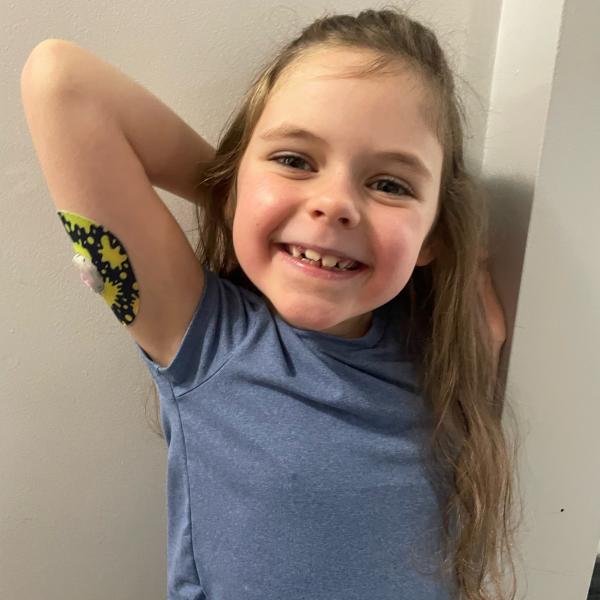Emma and Addison Eagles: Finding strength and hope in life with type 1 diabetes

“Part of my body just doesn't work like everyone else's, but that's okay!" – Addison Eagles, age 6
This World Diabetes Day, the focus is on Living Well with Diabetes, and six-year-old Addison Eagles and her mom, Emma, offer an inspiring example. Diagnosed with type 1 diabetes in April 2024 at just five years old, Addison has already embraced her new reality with courage and, as her mom describes, a quiet strength.Even before Addison’s diagnosis, Emma knew more than most about type 1 diabetes; her older sister was diagnosed as a child, giving Emma a front-row view of what it takes to manage the disease. Still, seeing her own young daughter face this challenge brought a new level of dedication and purpose.
In the weeks leading up to Addison’s diagnosis, Emma and her husband Artie noticed their daughter didn’t seem like herself. She was more tired, drinking water constantly, and waking up frequently at night to use the bathroom. Addison had lost weight, and her usual cheerful personality was clouded by unexpected mood swings. "I was thinking, 'Is this the new Addison? Is this what I have to look forward to in her teenage years?'" said Emma.
Emma’s instincts urged her to dig deeper. With her sister’s experience in mind, she asked for Addison to be tested for type 1 diabetes. “When the results came back, they called us and said to take her straight to the emergency department. Something was wrong. There, they told us she needed insulin, and I felt my world shift.” Even though she had expected them, hearing those words out loud was a shock.
Adjusting to this new reality meant Addison quickly had to get used to needle pokes, blood sugar checks, and insulin doses. Addison adapted to her new routine with remarkable strength. “She took the needles like a champ right from the start,” Emma said. “She lifts her shirt or rolls up her sleeve and just takes it in stride. I’m so proud of her.”
For Addison, understanding her condition and staying positive have played a big role in her adjustment. "When I was first diagnosed, it made me feel a little scared and a little happy because I knew I was going to start to feel better," she said.
Helping Addison manage her diabetes 24/7 is no small task. She takes insulin multiple times a day and wears a continuous glucose monitor (CGM) that sends updates to Emma and Artie’s phones.

“The CGM has been a game-changer,” Emma said. “It lets us check her levels anytime, and alarms let us know if she’s too high or too low.”
This technology has given the family a bit of peace of mind, allowing them to see Addison’s blood sugar in real time as she goes about her day at school, dance and swimming.
Emma has built a strong partnership with Addison’s school to ensure her daughter’s needs are supported. At the start of the year, she distributed “activity snack packs” throughout the building for quick access in case Addison’s blood sugar drops. Each day, Emma collaborates with staff to adjust Addison’s lunchtime insulin dose based on what’s packed in her lunch and her current blood sugar levels.
“The school has been incredible,” Emma said. “They check in with me about the lunchtime insulin dose, based on what I’ve packed, and the education assistants are trained to give her the injection.”
If the trained staff aren’t available, Emma steps in to help.
“If there’s a staff shortage, I go to the school to give Addison her insulin. It’s a team effort.”
Reflecting on her mother’s experience when her sister was diagnosed, Emma feels grateful for the support available today. “I don’t know how she did it,” she said. “There were no monitors or alarms, and teachers weren’t as knowledgeable about the disease. My mom had to trust her instincts and send my sister off to school, just hoping things would be okay.”
Emma’s sister, living with type 1 diabetes since childhood, is a go-to source for tips and support. “She’s our encyclopedia,” Emma laughed. “Whether it’s figuring out how much insulin is needed for a slice of pizza or how to handle Halloween candy, she’s always there.”
Explaining her condition to others helps Addison feel more empowered. “I want kids and grownups to understand it more, that part of my body just doesn't work like everyone else's but that's okay!" She also has a message of encouragement for other kids with diabetes: “I would tell them that it's okay to be a little scared, but it's going to get better because you can have a monitor to help you, insulin to make you feel better, and family to love you!”
Looking at her family’s journey—her mother’s strength, her sister’s expertise, and Addison’s resilience—Emma feels hopeful. “Seeing how far diabetes care has come since my sister was young gives me so much hope that someday, maybe there will be a cure for Addison,” she said. Her advice to other parents echoes her own experience: “Trust your instincts. If something doesn’t seem right, ask for answers and have your kids tested.”
For now, Emma is just focused on helping Addison live as fully and happily as possible. “As long as she’s smiling, I’m smiling,” she said. “We’re learning to live with diabetes, but it doesn’t define Addison. She’s a strong little girl, and together, we’re taking things one day at a time.”
Learn more about diabetes centres across Nova Scotia or access patient education resources on the Nova Scotia Health website for helpful tools and information related to diabetes care and management.
In the photo: Emma and Artie Eagles with their daughters, Addison (left) and Everly (right). In April of this year, the Eagles family learned Addison has type 1 diabetes.